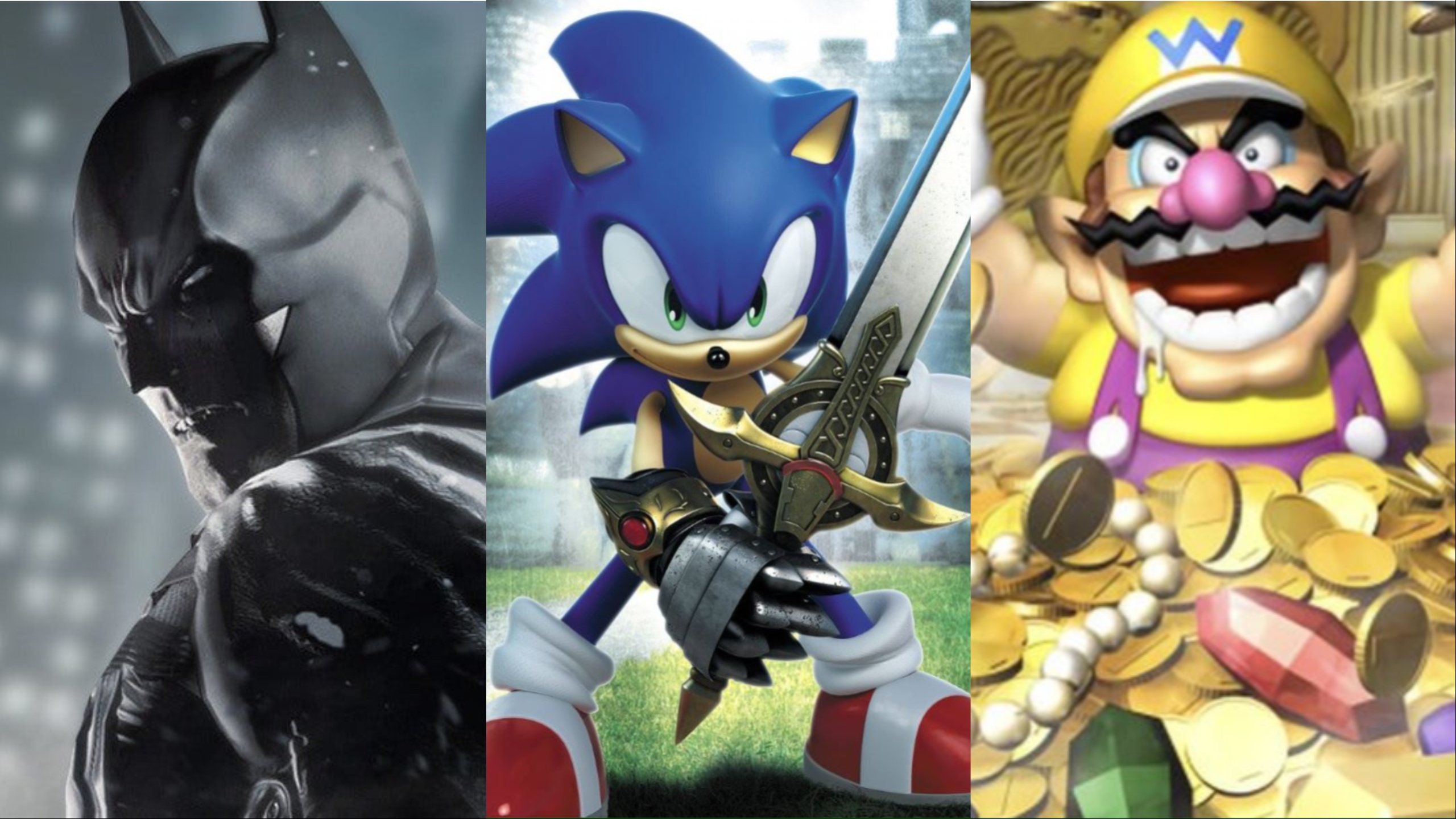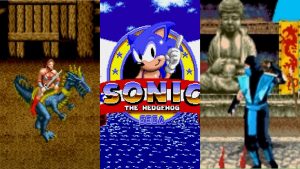
While video games have enjoyed a surprisingly long history of quality spin-offs, the fact is that the vast majority of video game spin-offs could most generously be described as forgotten. For every Mario Kart, Mega Man X, World of Warcraft, or Metroid Prime, you have hundreds of spin-off games that have largely been lost to time.
Yet, some forgotten video game spin-offs are far more interesting than others. Some are quite good and deserve more recognition than they’ll probably ever get. Others seem like they should have been a bigger deal than they ultimately were. Together, each of these games will make you ask some variation of the always fascinating question, “Wait, that game exists?”
The Misadventures of Tron Bonne – Mega Man (1999)
Given that the mainline Mega Man series tends to go dormant for long periods, it’s easy to forget that Mega Man is one of the most prolific franchises in gaming. Some estimates suggest over 120 Mega Man games have been released over the years. While most of those games are naturally obscure, The Misadventures of Tron Bonne represents an especially odd era for Mega Man gaming.
The name alone will likely draw a worthwhile “Huh?” from the majority of gamers. In case you’re wondering, it’s a reference to the character Tron Bonne: one of the antagonists from the Mega Man Legends titles. This game serves as both a prequel to those titles and an attempt at a spin-off of that spin-off series. It’s quite good, and who doesn’t love a game that lets you see things from a villain’s perspective? Ultimately, though, it turns out that releasing a niche spin-off to a relatively niche spin-off that doesn’t even have the original franchise’s name in the title was probably a bad marketing move.
Pokémon: Catch the Numbers! – Pokémon (2002)
In the wide wide world of obscure spin-offs to popular franchises, Pokémon: Catch the Numbers! checks most of the usual boxes. Unnecessary educational game? Check. Never released outside of Japan? Check. What ultimately separates this game from a legion of equally obscure candidates is the fact it was released for the Sega Pico.
Yes, this is a Pokémon game released exclusively for a Sega device. In fact, there were multiple Pokémon released for the Sega Pico: a bizarre edutainment handheld platform line that enjoyed a shockingly long run in Japan. Pokémon: Catch the Numbers! isn’t much of a game (it’s a glorified math lesson intended for a young audience), but this thing’s mere existence is a fascinating bit of lost gaming history. It was even released in 2002; only a year after Sega officially discontinued the Dreamcast.
Dino Stalker – Dino Crisis/Resident Evil (2002)
Dino Stalker enjoys the fascinating distinction of technically being a spin-off of two Capcom franchises: Resident Evil and Dino Crisis. It is functionally a continuation of the Resident Evil light gun spin-off series, Gun Survivor. However, it is based on the stories of the Dino Crisis games and seemingly exists within the same universe. The fact it also contains several references to the Resident Evil franchise will almost surely make shared universe lore junkies’ heads spin.
Unfortunately, the rest of this game is not really that interesting. Like the other Gun Survivor games, this one immediately loses a lot of its theoretical appeal if you can’t play it with a quality light gun accessory. Even then, it’s just not nearly as good as the best light gun games released for the arcades over the years. The shame of it is that the action-heavy (and brilliant) Dino Crisis 2 strongly suggested that the series could have thrived in a more combat-focused setting. Whatever potential may be there, though, just isn’t realized in this thoroughly unremarkable game.
Wario World – Super Mario (2003)
I’d go so far as to say that the majority of video games technically featuring Mario (or a Super Mario character) are obscure to the vast majority of gamers. Yes, Mario is arguably gaming’s definitive cultural icon, but we’re talking about a franchise that technically spans well over 200 games. Suffice to say, most of them got lost in the shuffle. What’s remarkable about Wario World isn’t that it’s obscure but rather it really shouldn’t be nearly as obscure as it is.
After all, this was a 2003 GameCube title that got a global release and was developed by Treasure. Yes, that’s the same Treasure responsible for beloved action games like Gunstar Heroes and Sin and Punishment. So why have you probably never heard of this? Well, some of it has to do with the general market struggles of the GameCube at that time, but the game itself is honestly a mixed bag. It’s a fascinating blend of 3D platforming and combat that struggles to get either of those things right across its painfully short runtime. Still, this one has enough going for it to make it worthy of a re-release.
The Urbz: Sims in the City – The Sims (2004)
If The Sims had an embarrassing yearbook photo, it would be The Urbz.
The idea was to give handheld and console gamers their own version of The Sims that was modified to account for the lack of proper mouse and keyboard controls. It was a good idea, but for some reason, it was decided to make this a more objective-based game built around an almost GTA-like reputation system. Worse, someone also decided to give this game a vaguely hip-hop style complete with cameo appearances and modified music from the Black Eyed Peas. Just give this a look and listen if you want to understand the depths of pop culture that were explored as part of this project.
Calling this game a product of its time is generous. Believe me, it was plenty awkward in its day. Yet, there are some genuinely interesting gameplay ideas here that sadly don’t come together to form anything worthy of the proper Sims titles. Interestingly, the handheld version of the game fares slightly better. That’s partially due to the change in format but largely because the Black Eyed Peas are replaced with a story involving organized crime, vampires, and time travel. It’s a net positive.
Metal Gear Acid – Metal Gear Solid (2004)
While arguably one of the most popular spin-offs on this list, it’s remarkably easy to forget about the time when Hideo Kojima helped turn Metal Gear Solid into a turn-based card strategy series called Acid. At the time of its release, this PSP exclusive received largely negative reviews and struggled to find much of an audience in either that genre or the franchise.
However, its sequel, Metal Gear Acid 2, is actually quite good. It made a number of necessary mechanical improvements to the original game and is one of the most stylish entries in a series that has rarely suffered from a lack of personality. Given the reaction to recent card-based strategy titles and…well, the state of Konami/Metal Gear/Hideo Kojima, we’ll probably never see this spin-off series again.
Doom RPG – Doom (2005)
Following the mixed reaction to Doom 3 and the various changes that game made to the established Doom formula, you’d think that id Software would play it safe with their upcoming entries in the series. Instead, they (technically, Fountainhead Entertainment under the direction of id veterans) decided to release a turn-based Doom RPG exclusively for mobile phones. Go figure.
You know what’s really funny, though? Doom RPG is an incredible game. I mean, you’ve got to put some mid-2000s mobile game blinders on when you’re judging it, but it’s one of the best mobile titles of that era and a genuinely compelling RPG in its own right. I know that the Doom series is in the midst of a much-deserved and high-acclaimed renaissance at the moment, but we’d all be blessed to get another one of these games in the near future.
Crash Boom Bang! – Crash Bandicoot (2006)
Crash Boom Bang! is a Nintendo DS party game set in the Crash Bandicoot universe. On paper, that’s an incredible idea. After all, CTR is one of the few viable Mario Kart competitors out there, so why shouldn’t Crash have his own version of Mario Party as well?
This one falls apart the moment you try to play it, though. The minigames serve as a thesis for a new field of physics known as “anti-fun,” and the overarching board game mechanics often slow the action down to a crawl. At best, the game’s primary systems are poorly balanced. However, there’s a real argument to be made that the whole thing is fundamentally broken, which is a shocking possibility to consider when you’re talking about a fairly major release for its time.
Final Fantasy XII: Revenant Wings – Final Fantasy (2007)
The reason this spin-off is so fascinating is also the reason it seemingly shouldn’t qualify for this list. See, Revenant Wings is technically a sequel to Final Fantasy 12. Yes, they made a sequel to one of the most popular Final Fantasy games ever that also continues that title’s exceptional narrative. So why haven’t you (probably) heard of this one?
Well, it’s probably because of absolutely everything else about the game. Despite being a sequel to Final Fantasy 12, this is considered to be a non-canonical entry in the Final Fantasy series. For that matter, it’s also a real-time tactical RPG: a truly bizarre combination of concepts made all the more confusing by the incorporation of traditional turn-based mechanics. The game itself is a pretty good time and an undeniably fascinating experiment. However, the fact you have to read a dossier to understand what it is and what it’s trying to do gets to the heart of how it fell into obscurity.
Castlevania Judgment – Castlevania (2008)
While I initially thought that Kid Dracula (a platformer parody of the Castlevania franchise) would be the Castlevania entry on this list, the fact of the matter is that spin-offs are rarely weirder or more obscure relative to the nature of their production than Castlevania Judgment is.
Castlevania Judgment is a Castlevania-themed fighting game, but trust me when I say that description does little to explain what makes this game so odd. Judgment’s bizarre roster of playable characters is brought to life via an art style that is both not good and not at all representative of the rest of the franchise. Worse, the game features several ambitious ideas (including a trap system and sub-weapon mechanics) that are negated by its awful Wii controls and terrible camera system. You have to imagine the development of this game fell apart right away and was ultimately released into the world with a mournful glance at what could have been.
Sonic and the Black Knight – Sonic the Hedgehog (2009)
Sonic hasn’t been quite as prolific as Mario over the years, but Sega’s mascot has appeared in dozens of games you have probably never heard of and certainly shouldn’t try to play. What makes this one special, though, is that it’s not that old, got a global release, and is actually the second entry in Sonic Storybook: a spin-off series most people never knew was even a thing.
The Sonic Storybook series was meant to function as a kind of RPG take on the Sonic franchise that transported the character to mythical lands. The first game in the series (2007’s Sonic and the Secret Rings) was a deeply flawed but interesting experiment. Somehow, Sonic and the Black Knight is much worse. Whatever fun could have been mined from dropping Sonic into the world of King Arthur is instantly undone by wonky controls, awful acting, and bad writing. Sega has pretty much purged this game and spin-off series from the planet, and I can’t blame them for doing so.
Batman: Arkham Origins Blackgate – Batman: Arkham (2013)
The idea behind this game was truly inspired. Developer Armature Studio aspired to turn the Arkham Asylum series (Arkham Origins, specifically) into a 2.5D side-scrolling game in the style of something like Mark of the Ninja or Shadow Complex. If you know anything about those games, you probably also know how well a Batman-themed version of those games should work. Sadly, that’s not what we got.
Instead of turning the Metroidvania-esque Arkham Asylum into a proper Metroidvania title, Blackgate offers an often worse stripped-down version of the major titles in that series. The few new ideas this game brings to the table are sloppily implemented, and its attempts to replicate the best elements of the Arkham games strongly suggest that this game’s production suffered from a lack of all known resources. Unfortunately, I doubt anyone will get the chance to do this worthwhile concept justice anytime soon.
Slashy Souls – Dark Souls (2016)
Granted, this is more of a tie-in than a spin-off, but how can’t you talk about the time that GameStop was permitted to spearhead an Endless Runner mobile title based on the Dark Souls series?
Ahead of Dark Souls 3’s highly-anticipated release, GameStop asked to fund a mobile title based on that series, and Bandai Namco made the truly terrible decision to let them do it. No matter how low your exceptions for that game may be, let me tell you right now that they are way too high. This is a strictly awful mobile title that is, at best, a notch above those scam games you see in Google Play ads. The fact it is officially associated with the Dark Souls franchise is bewildering and appalling.
Halo: Fireteam Raven – Halo (2018)
It’s certainly unusual that there is a Halo light gun arcade game released mostly at select Dave and Busters locations starting in 2018. It’s also a welcome surprise to learn that the game is actually quite fun if you happen to be lucky enough to ever find a way to play it (and a person to play it with). What’s really interesting about this one, though, are the ways this game tries (and seemingly struggles) to fit into the Halo universe.
Fireteam Raven is supposedly set during the events of Halo: Combat Evolved but sees you play as generic Marines instead of Master Chief. In reality, the game is more of a Hall of Fame collection of Halo enemies, vehicles, and other design concepts mashed into the framework of the original game’s setting. Most of those ideas do not belong in that time and place and are downright odd to see squeezed into the seemingly fragile framework of the original game. It’s a minor and largely insignificant observation to make about a Dave and Buster’s novelty attraction, but it’s hard not to dwell on such an obscure game that feels like it would have been a major deal in a much different era.
Gears Pop – Gears of War (2019)
Gears Pop was revealed at E3 2018 alongside Gears Tactics and Gears 5. The former was a fascinating genre experiment that deserves more love, and the latter was, naturally, the next major game in the Gears of War franchise. By comparison, Gears Pop drew a few laughs and a lot of groans but was pretty much forgotten about not long after its reveal.
Honestly, it’s for the best. Gears Pop is essentially a Gears of War-themed take on Clash Royale that lacks pretty much anything that is woefully lacking all Gears of War-specific features that could have possibly made it interesting. Look, this thing was always meant to be a cash-in, but this may just be the most uninspired mobile game based on a major console franchise in the history of that largely sad subgenre. This game was shut down a couple of years after its release, and it’s shocking it lasted that long.
The post 15 Forgotten Video Game Spin-Offs appeared first on Den of Geek.











